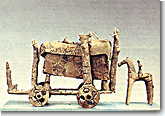Views about the will - what exactly it meant and who it could be drawn up by - are fairly various. The view obtaining earlier was that the will could be drawn up only by someone who had no legitimate male descendants, whereas in the contrary case the special regulations ordered by the deceased were simply an episkepsis (orders-and-guidelines). According to more recent research, these views should be modified as follows. Anybody could draw up a will. Purely in cases where there were legitimate sons he could not will the assets of his oikos without taking them into consideration.  Moreover, by his will - even before Solon's legislature - a person who had no legitimate descendants could provide for the continuation of his oikos through the so-called dia diathekes huiothesia. This resulted to a confusion both in the ancient sources - certain of them refer to will as adoption on some occasions, and on others wrongly using episkepsis - and among modern students of the subject, who have interpreted the same term in different ways. Again, one could in one's will appoint a guardian for children who were minors, and a kyrios for women who had come of age; provide for the marriage of one's widow or one's daughter, even to the extent of the relevant pledge ; and also recommend what the dowry should be in either case. One could even regulate the division of the estate between one's sons, and decide on small gifts or bequests to third parties. Lastly, one had the right to lay down guidelines for one's funeral rites (ekphora), and to enjoin upon one's heirs the prosecution of any person responsible for one's death. Moreover, by his will - even before Solon's legislature - a person who had no legitimate descendants could provide for the continuation of his oikos through the so-called dia diathekes huiothesia. This resulted to a confusion both in the ancient sources - certain of them refer to will as adoption on some occasions, and on others wrongly using episkepsis - and among modern students of the subject, who have interpreted the same term in different ways. Again, one could in one's will appoint a guardian for children who were minors, and a kyrios for women who had come of age; provide for the marriage of one's widow or one's daughter, even to the extent of the relevant pledge ; and also recommend what the dowry should be in either case. One could even regulate the division of the estate between one's sons, and decide on small gifts or bequests to third parties. Lastly, one had the right to lay down guidelines for one's funeral rites (ekphora), and to enjoin upon one's heirs the prosecution of any person responsible for one's death.
|












